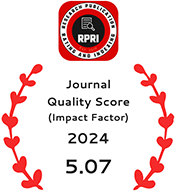Implementing Predictive Analytics for Proactive Revenue Cycle Management
DOI:
https://doi.org/10.55544/jrasb.3.4.9Keywords:
Healthcare system, predictive analytics, proactive revenue, managementAbstract
This research investigates the deployment of predictive analytics in the revenue cycle management (RCM) system in health-care organizations. In other words, adopting predictive analytics strategies that are more proactive rather than only the reactive approach has the potential of greatly increasing the revenue capture, decreasing the denial rates, and increasing the efficiency of operation. The analysis of the literature and the results of the research indicate that the RCM benefits from the use of predictive analytics; all the while having acknowledged some challenges, including data integration and the requirement for professionals that understand the field.
Downloads
References
Poornima, S. and Pushpalatha, M., 2020. A survey on various applications of prescriptive analytics. International Journal of Intelligent Networks, 1, pp.76-84.
Darvazeh, S.S., Vanani, I.R. and Musolu, F.M., 2020. Big data analytics and its applications in supply chain management. New Trends in the Use of Artificial Intelligence for the Industry, 4, p.175.
Nordal, H. and El‐Thalji, I., 2021. Modeling a predictive maintenance management architecture to meet industry 4.0 requirements: A case study. Systems Engineering, 24(1), pp.34-50.
Hausladen, I. and Schosser, M., 2020. Towards a maturity model for big data analytics in airline network planning. Journal of Air Transport Management, 82, p.101721.
Zaki, K., 2022. Implementing dynamic revenue management in hotels during Covid-19: value stream and wavelet coherence perspectives. International Journal of Contemporary Hospitality Management, 34(5), pp.1768-1795.
Kristoffersen, E., Mikalef, P., Blomsma, F. and Li, J., 2021. Towards a business analytics capability for the circular economy. Technological Forecasting and Social Change, 171, p.120957.
Mathrani, S. and Lai, X., 2021. Big data analytic framework for organizational leverage. Applied Sciences, 11(5), p.2340.
Zadeh, E.K. and Safaei, M., 2024. Maximizing Lifecycle Profitability in Technology Products Through Enhanced Sentiment Analysis and Dynamic Pricing. International Journal of Industrial Engineering and Construction Management (IJIECM), 1(1), pp.21-29.
Jiang, Y., Feng, T. and Huang, Y., 2024. Antecedent configurations toward supply chain resilience: The joint impact of supply chain integration and big data analytics capability. Journal of Operations Management, 70(2), pp.257-284.
Koch, H., Chipidza, W. and Kayworth, T.R., 2021. Realizing value from shadow analytics: A case study. The Journal of Strategic Information Systems, 30(2), p.101668.
Aggarwal, P.K., Jain, P., Mehta, J., Garg, R., Makar, K. and Chaudhary, P., 2021. Machine learning, data mining, and big data analytics for 5G-enabled IoT. Blockchain for 5G-Enabled IoT: The new wave for Industrial Automation, pp.351-375.
Marie-Magdelaine, N. and Ahmed, T., 2020, December. Proactive autoscaling for cloud-native applications using machine learning. In GLOBECOM 2020-2020 IEEE Global Communications Conference (pp. 1-7). IEEE.
Tilala, M., & Chawda, A. D. (2020). Evaluation of compliance requirements for annual reports in pharmaceutical industries. NeuroQuantology, 18(11), 138-145. https://doi.org/10.48047/nq.2020.18.11.NQ20244
Tilala, M., Pamulaparthyvenkata, S., Chawda, A. D., & Benke, A. P. (2022). Explore the technologies and architectures enabling real-time data processing within healthcare data lakes, and how they facilitate immediate clinical decision-making. European Chemical Bulletin, 11, 4537-4542.
Tilala, M. (2023). Real-time data processing in healthcare: Architectures and applications for immediate clinical insights. International Journal on Recent and Innovation Trends in Computing and Communication, 11(11), 1119-1125.
Mitul Tilala, Abhip Dilip Chawda, Abhishek Pandurang Benke, Akshay Agarwal. (2022). Regulatory Intelligence: Leveraging Data Analytics for Regulatory Decision-Making. International Journal of Multidisciplinary Innovation and Research Methodology, ISSN: 2960-2068, 1(1), 78–83. Retrieved from https://ijmirm.com/index.php/ijmirm/article/view/77
Challa, S. S. S., Tilala, M., Chawda, A. D., & Benke, A. P. (2021). Navigating regulatory requirements for complex dosage forms: Insights from topical, parenteral, and ophthalmic products. NeuroQuantology, 19(12), 971-994.
Challa, S. S. S., Chawda, A. D., Benke, A. P., & Tilala, M. (2023). Regulatory intelligence: Leveraging data analytics for regulatory decision-making. International Journal on Recent and Innovation Trends in Computing and Communication, 11(11), 1426-1434.
Challa, S. S. S., Chawda, A. D., Benke, A. P., & Tilala, M. (2024). Streamlining Change Control Processes in Regulatory Affairs: Best Practices and Case Studies. Integrated Journal for Research in Arts and Humanities, 4(4), 67–75. https://doi.org/10.55544/ijrah.4.4.12
Tilala, M. H., Chenchala, P. K., Choppadandi, A., Kaur, J., Naguri, S., Saoji, R., & Devaguptapu, B. (2024). Ethical considerations in the use of artificial intelligence and machine learning in health care: A comprehensive review. Cureus, 16(6), e62443. https://doi.org/10.7759/cureus.62443
Downloads
Published
How to Cite
Issue
Section
License
Copyright (c) 2024 Ritesh Chaturvedi, Dr. Saloni Sharma

This work is licensed under a Creative Commons Attribution-NonCommercial-NoDerivatives 4.0 International License.


















